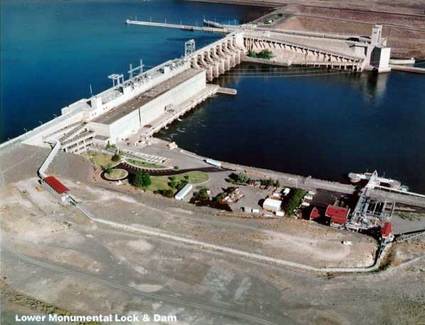forum
library
tutorial
contact

Leadership Change at Port of Lewiston:
Managers Talk Snake River Dams
by Matt Weaver
Capital Press, August 8, 2022
|
the film forum library tutorial contact |

|
Leadership Change at Port of Lewiston:
by Matt Weaver
|
During 2020's record harvest, roughly 250 barges were loaded with wheat and sent downriver.
 LEWISTON, Idaho -- Stopping any plans to breach the four lower Snake River dams remains a top priority, the incoming and outgoing general managers of the Port of Lewiston say.
LEWISTON, Idaho -- Stopping any plans to breach the four lower Snake River dams remains a top priority, the incoming and outgoing general managers of the Port of Lewiston say.
"It has gone from a science-based and practical application of the river kind of a decision and it's become political," said Scott Corbitt, the new manager. "Once things become political, it just gets a whole lot harder to make good decisions. You get other influencers than what those of us who want to base it on facts and data would really want."
The Snake River dams were a big part of David Doeringsfeld's job interview 28 years ago. It's still the biggest issue today, he said.
Corbitt began at the port in late June. He will replace Doeringsfeld, who retires at the end of January. The two managers are working together during the transition.
The port is an economic and agricultural hub for the region. During 2020's record harvest, more than 30 million bushels of grain went through the Lewis-Clark Terminal, a cooperative serving 4,000 farm families that puts more barges on the river system than anyone else, Doeringsfeld said.
That year, roughly 250 barges were loaded with wheat and sent downriver. Each barge holds 122,500 bushels, or roughy 3,334 metric tons.
"A farmer can be harvesting in an area around north central Idaho and within five to six days, that grain can be on an ocean-going vessel headed out to the Pacific Rim," Doeringsfeld said. "There's not a lot of areas where there's that kind of efficiency built into their exports."
Both agree preserving the Snake River dams is the top priority.
"If those dams should go away, and barge traffic should no longer be present, it changes everything," Corbitt said. "It adds costs to our farmers who already have years where they lose money. It adds complexity, it adds time, it adds a degree of difficulty getting crop to market to export to customer that haven't had to deal with those issues for decades and decades. It changes the ball game completely."
Removing the dams would have a "devastating impact" on agriculture, but also on the quality of life within the community, Doeringsfeld said.
"Congressman Mike Simpson, when he came out with this concept, made a statement that if agriculture was opposed to his idea, he would drop it," Doeringsfeld said. "Well, every agricultural organization in the state has come out opposed, as well as our governor and Legislature. If anything, the congressman has doubled down on his efforts for dam breaching."
Formerly the president and CEO of Valley Vision Inc., a nonprofit economic development authority in Lewiston, Corbitt said current projects at the port, including expanding broadband internet from Moscow to Grangeville, a 95-mile stretch appealed to him.
"It's such a unique position," Corbitt said. "We are Idaho's only seaport, which sets us apart from every other governmental organization in the state. We have such a unique situation here, at basically the end of the navigable part of the Columbia-Snake river system."
"It's time," Doeringsfeld said of his plans to retire. "Scott couldn't be better suited for coming in and taking over the reins."
"And I'm going to have him on speed dial," Corbitt added.
The port will continue its support for farmers, Corbitt said.
"We're here for them, we're going to keep fighting for them, we're open for their business, we want to bring their grain to the port of Lewiston and move it like we always have, to their advantage," he said. "We're going to stay in the fight."
Related Pages:
Will Taxpayers Dub It a 'Port to Nowhere'? by Marty Trillhaase, Lewiston Tribune, 4/1/15
learn more on topics covered in the film
see the video
read the script
learn the songs
discussion forum
